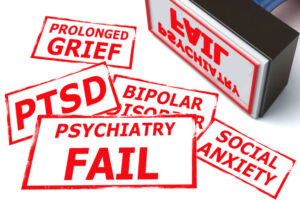
A website visitor emails that her relative, a young woman of 19, has been diagnosed with bipolar disorder. She asks if it is a valid diagnostic label or just another excuse to justify bad behavior. Psychiatrists define bipolar disorder as mood instability, characterized by fluctuation between exaggerated negativity (depression) and exaggerated optimism (mania).
My answer is this: We humans are both mind and body, with the free will to exercise our mental capacity to form concepts. The concepts can be as simple as “table” and “chair,” or as sophisticated as “justice” or “theory of relativity.”
Deeply held concepts, especially those associated with values, can trigger specific emotional states. For example, the popular – but sadly mistaken – idea that “my life is worthwhile only if I serve others” can lead to neurotic guilt, depression, and self-effacement. Conversely, the concept that “I should be happy and go after what I want in life” can bring about a state of optimism and benevolence.
Our minds are not mystical ghosts, devoid of physical correlation. By the same token, neither are they just a series of chemical reactions and genetic structures. Our minds consist of ideas, premises, beliefs, emotions, and convictions – some true, some false, and some a mixture of both.
The effect of medication on our emotional states is anything but clear. Sometimes there is evidence to suggest so; at other times there’s none. Many psychiatrists and drug companies exaggerate the benefits of psychiatric medication; implying that improvements in mood are due solely to physical changes. Other factors are never considered.
Emotions are not determined exclusively by one’s physiological state. It’s just as plausible that the chemical imbalances thought to determine bipolar disorder are results, rather than the causes, of emotional turmoil. In other words, it could be that ideas and emotions alter the physiological structure of the brain, rather than the other way around.
This hypothesis is never put to the test, because today’s bias is overwhelmingly in favor of the notion that “biology is destiny.” Nobody seems interested in the possibility that concepts and beliefs could contribute to emotional states.
So, is the writer’s relative making an excuse simply because she honestly acknowledges having bipolar symptoms? Not necessarily. The label is relevant, but it’s not the crucial issue with respect to personal responsibility. The crucial issue is whether she allows herself to recognize her free will and her choice to validate or refute basic ideas.
More important than the psychiatric label du jour is the individual’s philosophy of life, i.e., “I will take medication only if I see clear evidence that it provides me with some relief and stability. I still have control over my choices! If I look inward and discover that some of my ideas are mistaken, then I’ll take responsibility for challenging and correcting them. The medication can serve as a means to that end, but not as an end in itself.”
The bipolar label becomes an excuse if one defaults on the responsibility of thought and choice. And even if medication works initially as a wonder drug (which it usually doesn’t), my clients report that the effects generally wane over time.
Today’s psychiatric mainstream enables this default on a massive scale; not by explicitly rejecting it, but by acting and speaking as if it doesn’t exist.
The fatalism spawned by our victim-oriented culture is much more damaging than any disorder. So, my faithful reader can tell her relative to call herself bipolar if she likes. But she’s still in control of her destiny as long as she chooses to take responsibility for it.
